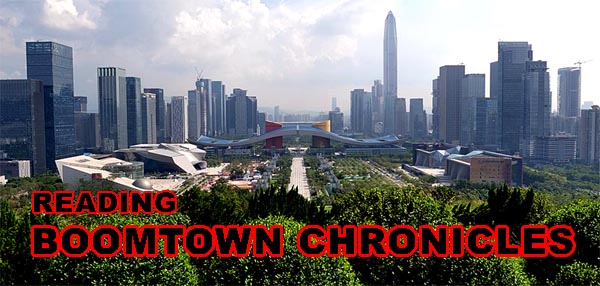 |
| Shenzhen, the Boomtown (Wikipedia) |
Note: Between Lesson #01-128 and #01-208, I wrote 72 lessons explaining expressions in articles published in the Shenzhen Daily. Read more about "Reading Boomtown Chronicles."
Get Ready: How important is modern technology to your life? In what ways do you use it?
Boomtown Chronicles Part XXII - published Monday, November 24, 2008
- Title: "Fishing village turned hi-tech powerhouse."
village: a rural settlement "smaller than a hamlet and larger than a town." A hamlet is sometimes defined as a village that lacks its own church; the ham- is related to "home," and -let is an ending to make it smaller, so "hamlet" means "small home."
"Village" is commonly used in Shenzhen to describe urban housing compounds. This use is not unknown in other countries, but I have seldom seen it used so frequently. The root is villa, originally a large country house. As other buildings began to develop around such a house, the settlement came to be called a "village."
Here's an interesting side-note: The word "villain" (the opposite of a hero) also comes from this word. As villains were crude in their manner and lacked "civilization," they were associated with the kind of behavior one would find outside of cities. In fact, the earliest meaning of "villain" was the same as "villager."
hi-tech (or high-tech): short for "high-technology." The difference between high and low technology is not exactly clear. It might be that "high-tech" includes the most recent advances in technology. As you can imagine, what was considered "high-tech" in the 1960s would be very low-tech today!
In addition, "high-tech" requires specialized skills and equipment. If someone develops a new type of hammer or frying pan, it would still not be considered "high-tech," as it would be fairly simple to make. Such items will always be considered "low-tech," no matter how up-to-date they might be.
Not surprisingly, the term "high-tech" itself is only 50 or 60 years old. "Technology," however, was first used in the 17th century. But here's something that makes an old English teacher happy: "technology" was originally applied to the study of grammar! It was the study ("-ology") of the technical aspects of language use. The word wasn't applied to scientific advances until 1859--about a hundred years before "high-tech" was coined.
--------
Read more: https://en.wikipedia.org/wiki/Shenzhen
Practice: Choose the correct term to fill in the blank in the sentence below:
- high-tech
- low-tech
- technology
- villa
- village
- villain
- In old-fashioned plays, the ________ always wore black clothes, and the good guy white ones.
- My new phone is very ________.
- We stayed in a "bed and breakfast" in a small ________ up on the mountainside.
- I prefer to use an older phone. It's sort of ________, but it's very dependable.
- The family enjoyed staying in the ________ they built by the seaside.
- I need ________! I can't even write with pen and paper anymore!
Answers are in the first comment below.
Submitted to the Shenzhen Daily for December 1, 2008


Answers to the Practice: 1. b; 2. d; 3. f; 4. e; 5. c; 6. a
ReplyDelete